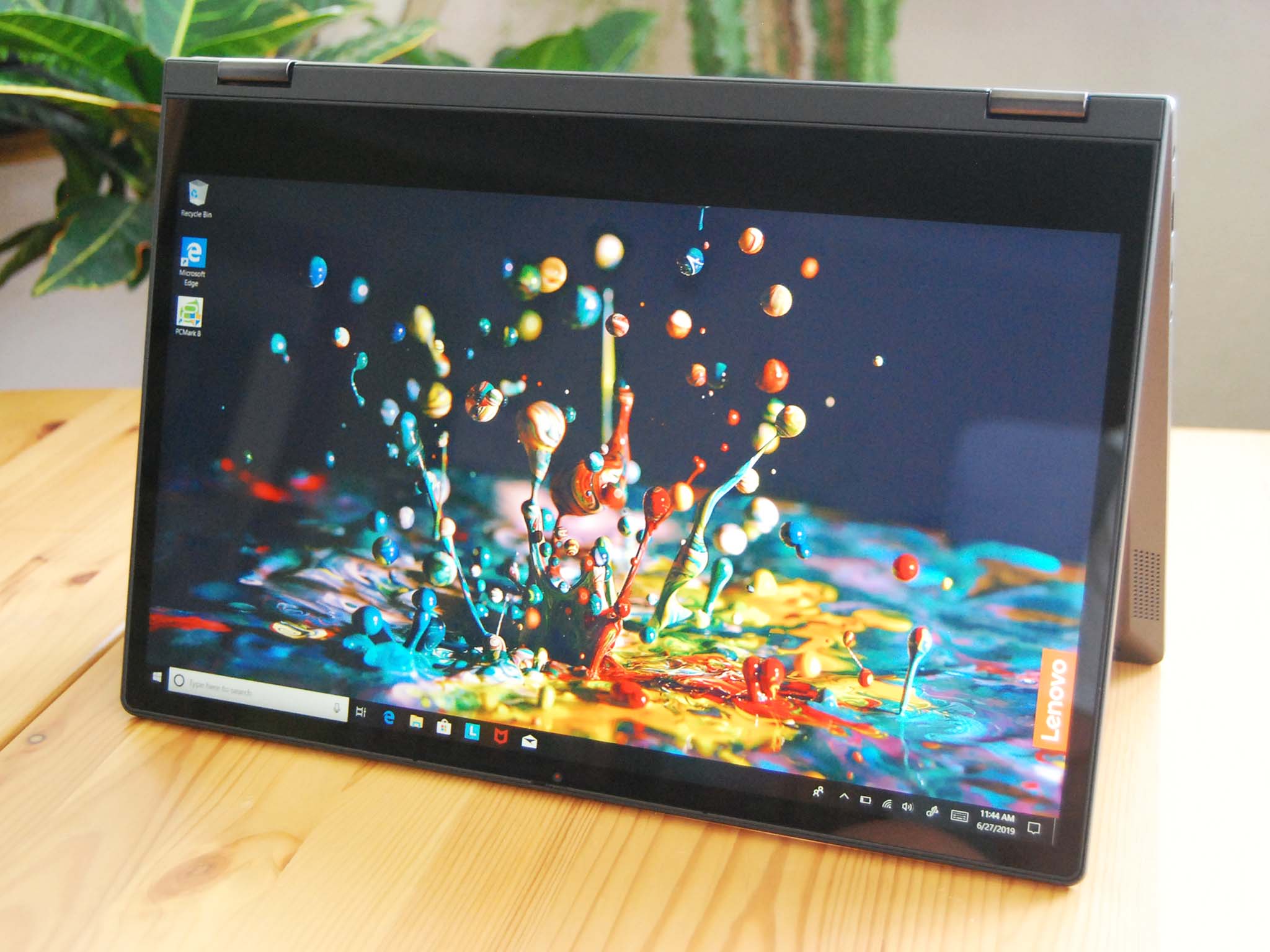
Lenovo's IdeaPad lineup encompasses quite a range of devices, from the top-tier IdeaPad S940 that we recently reviewed, down to more affordable options like the Flex devices. I have here the Flex 14 (Flex-14IWL if you're looking for a part number), a convertible laptop that starts at a very low price and comes with both AMD and Intel hardware options. I used it for about a week to see what it's all about and whether or not it's worth your time.
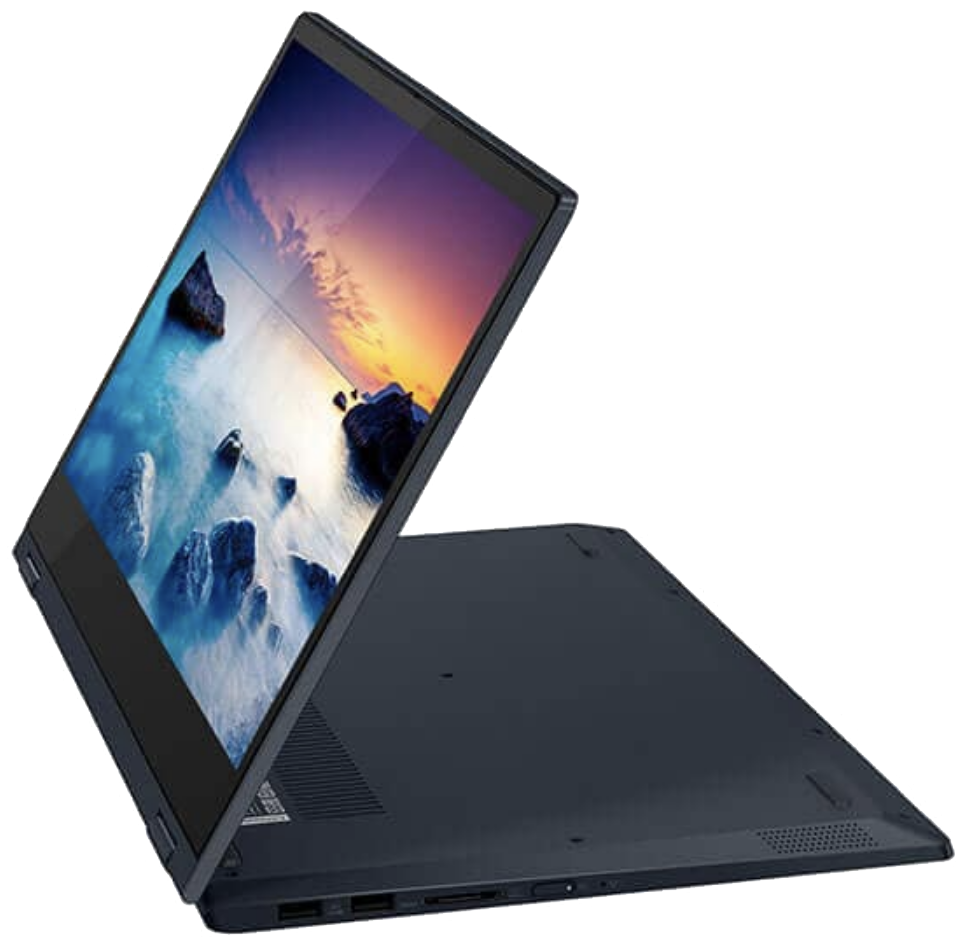
$550Bottom line: Battery life and display take a hit to keep the price down, but otherwise the IdeaPad Flex 14 is a good looking laptop with strong performance, and it can be had with AMD or Intel hardware.
For
- Sizeable Precision touchpad
- Webcam shutter
- Comfortable backlit keyboard
- Thin chassis
- Respectable performance
Against
- Underwhelming display
- Battery lasts between four and five hours
- Fan runs loud
Lenovo IdeaPad Flex 14 tech specs
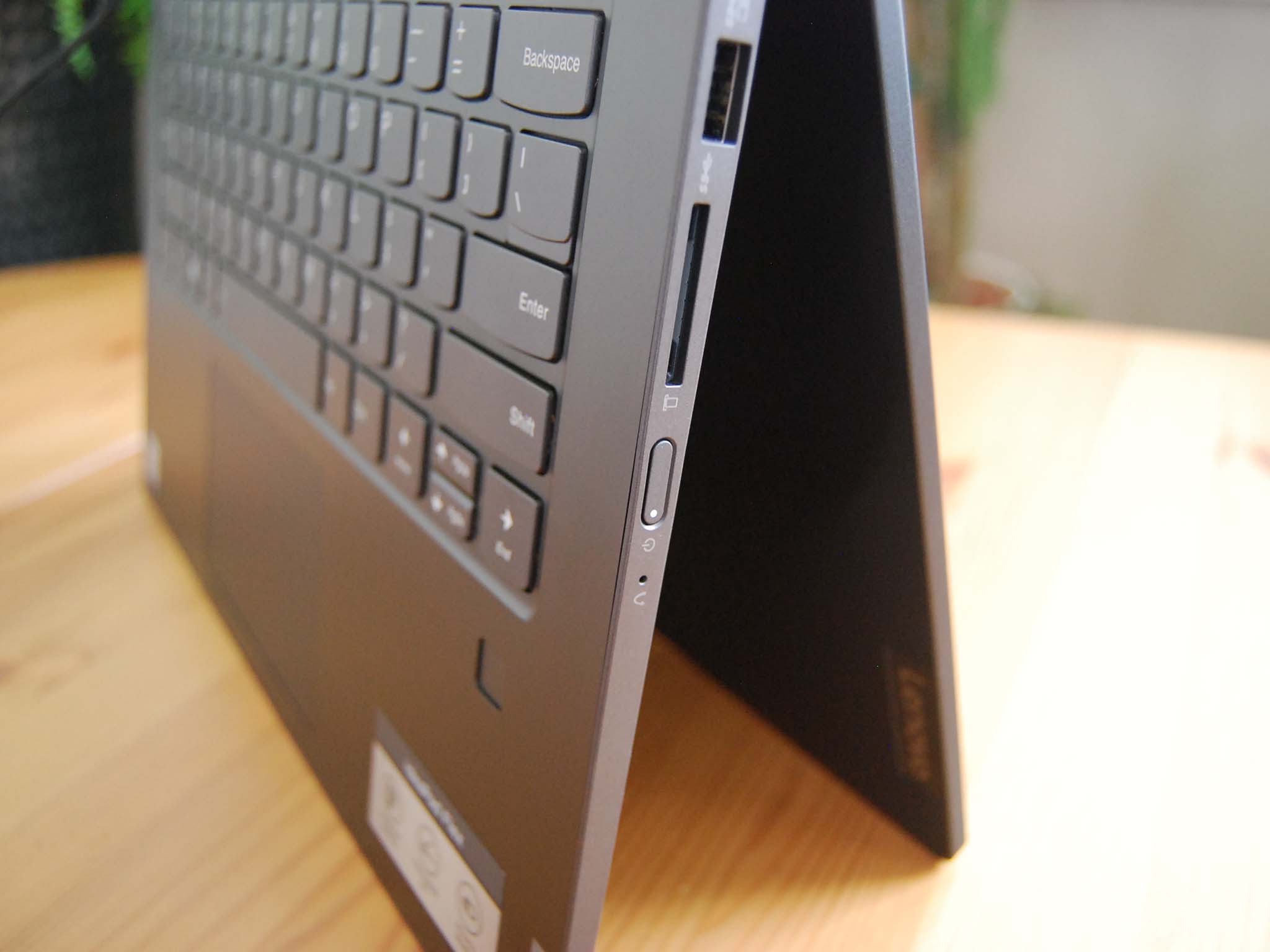
Lenovo supplied Windows Central with a review unit of the IdeaPad Flex 14. This particular model is packed with Intel hardware, including an 8th Gen Intel Core i5-8265U processor (CPU), 16GB of DDR4 RAM, and a 256GB M.2 PCIe solid-state drive (SSD). Lenovo doesn't currently offer this exact configuration, but it can be had for about $800 at Best Buy.
Configurations with lesser hardware can be found at Lenovo starting at about $450, and you can also find a model with new AMD Ryzen 5 3500U CPU at Amazon for about $550.
Here is a detailed breakdown of the exact specs in the review unit we used for about a week.
| Category | Spec |
|---|---|
| Processor | 8th GenIntel Core i5-8265UUp to 3.9GHzFour cores |
| RAM | 16GB DDR4-2400MHz |
| Graphics | Intel UHD 620 |
| Storage | Samsung PM981256GB M.2 PCIe SSD |
| Display | 14 inches1920x1080 (FHD)IPS, touch, glossy |
| Ports | Two USB-A 3.1USB-C 3.1HDMI 1.43.5mm audioSD card reader |
| Audio | Dual 2W speakersDolby Audio |
| Wireless | Intel Wireless-AC 9560802.11ac (2 x 2)Bluetooth 4.1 |
| Camera | Front-facing 720pWebcam shutter |
| Biometrics | Fingerprint reader (optional) |
| Keyboard | Backlit (optional) |
| Touchpad | Precision |
| Battery | 45Wh |
| Dimensions | 12.91 inches x 9.01 inches x 0.7 inches(328mm x 229mm x 17.9mm) |
| Weight | 3.64 pounds (1.65kg) |
Lenovo IdeaPad Flex 14 design and features
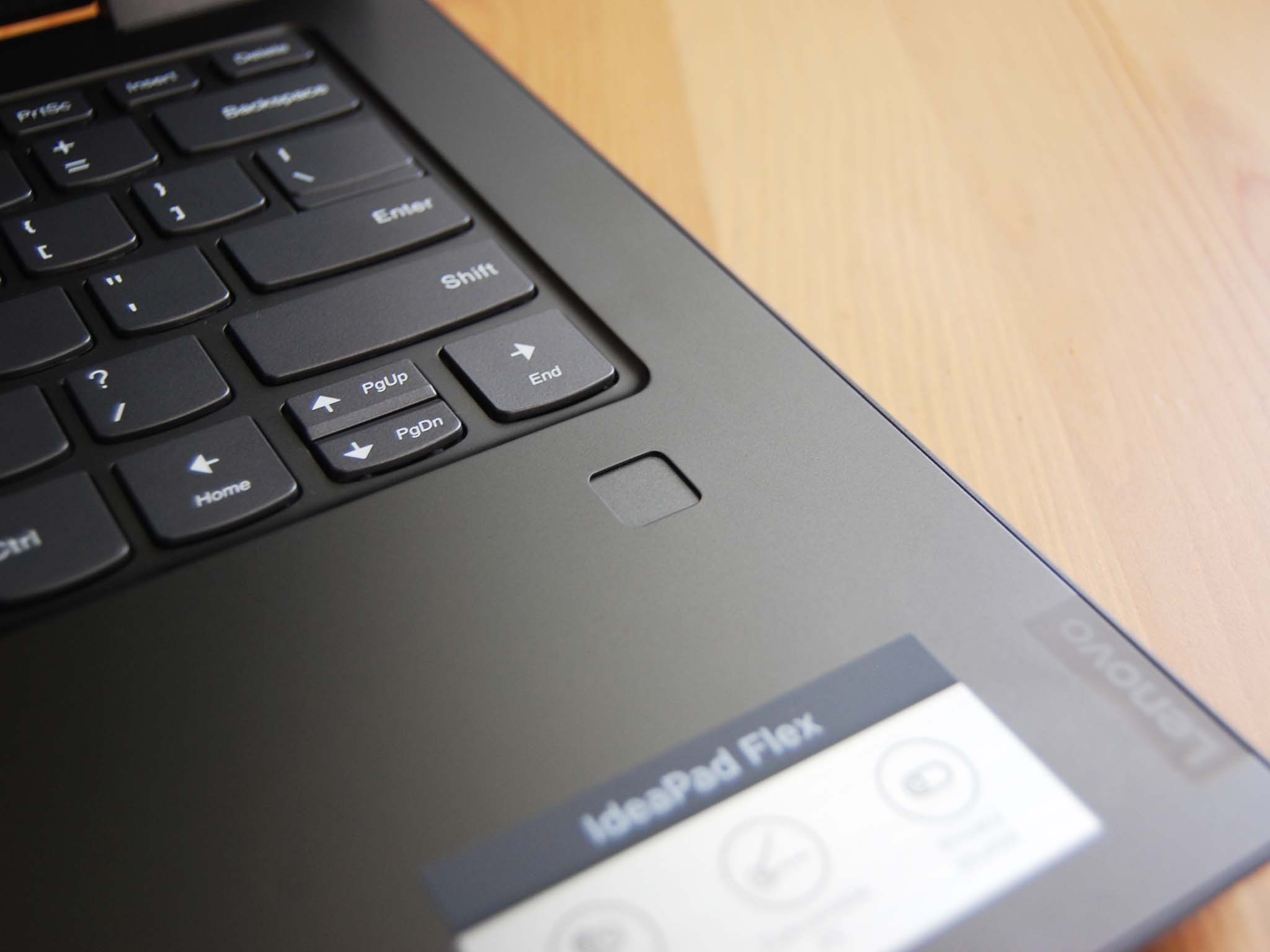
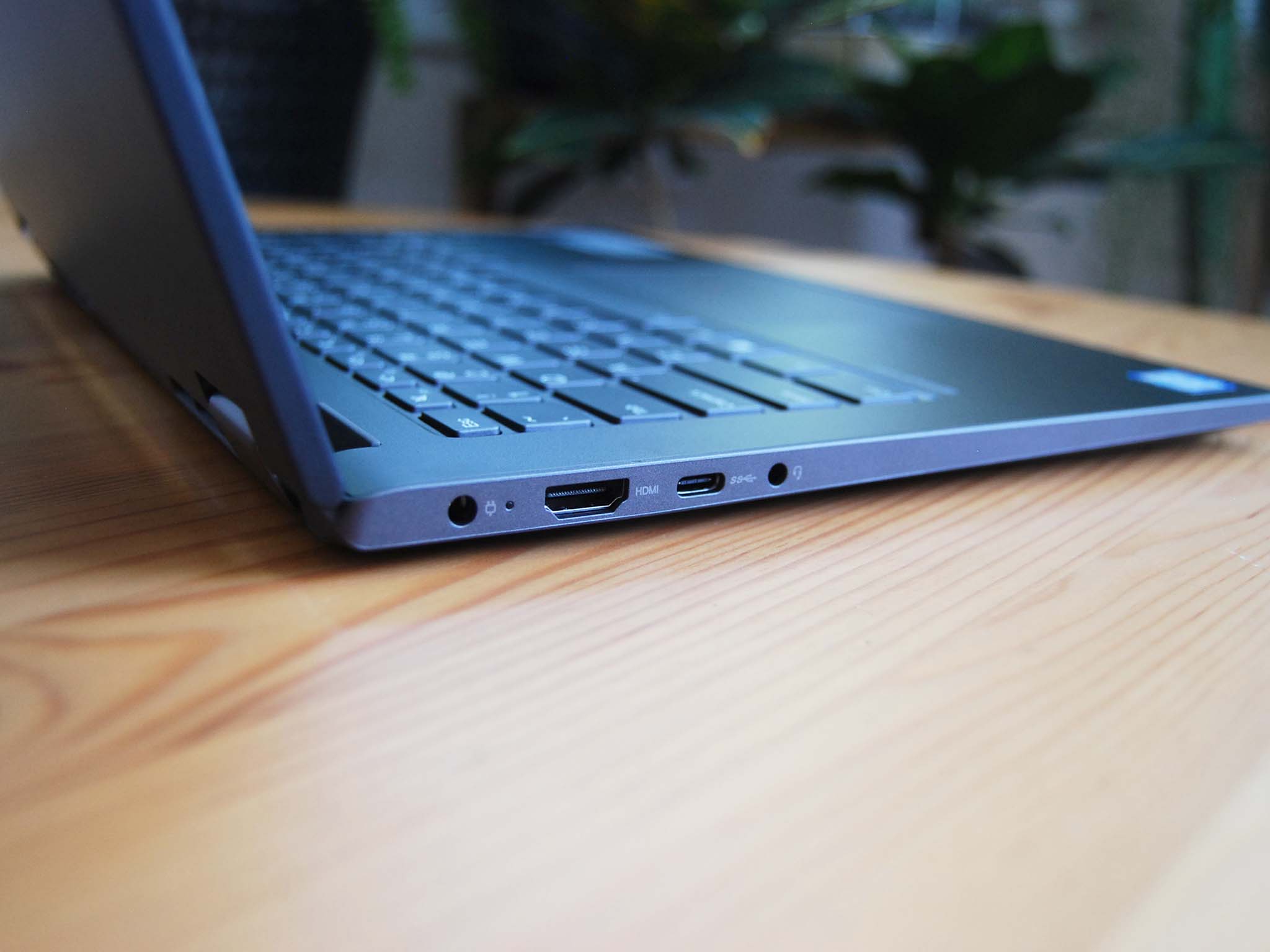
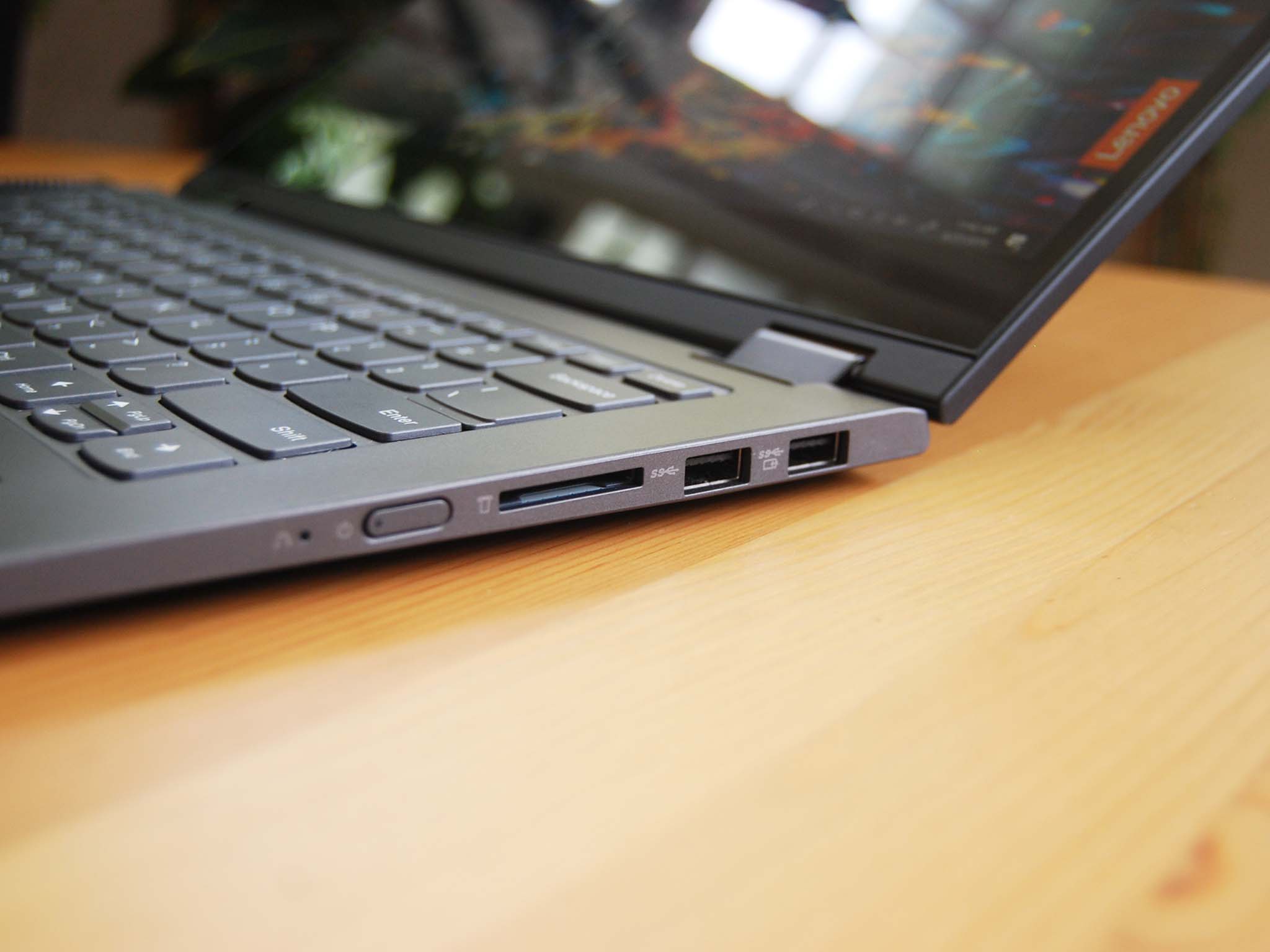
The Flex 14 blurs the line between budget and premium devices with its design. It's relatively slim for a convertible, coming in at just 0.7 inches thin, with a wedge design on the bottom that makes it look thinner and also keeps the down-firing speakers from being muffled by a desk or your lap. Sound is average for an Ultrabook, with good volume but a bit of a hollow feel. The laptop looks great sitting on a desk — the onyx black color also does a good job of hiding fingerprints — and the chassis, made primarily of a polycarbonate blend, seems durable and reasonably rigid.
Port selection is generous, and you shouldn't have a problem connecting most accessories and external displays. It's still using a barrel-style charger on the left side, which is accompanied by HDMI, USB-C, and a 3.5mm audio jack. On the right are two USB-A, an SD card reader, and the power button, which is set into the chassis to avoid accidental presses better when the laptop is in tablet mode. The dual hinges, which rotate around to tent, stand, and tablet modes, are tight enough to keep the lid from wiggling around but are smooth when converting.
The Flex 14 cuts some corners to keep costs down, but it's ultimately an attractive laptop with solid performance.
For those who need a laptop for productivity purposes, the Flex 14 keyboard should not disappoint. The large keys are slightly cupped and have the right amount of travel for a comfortable typing experience, and a backlight (which is optional) helps with working in low-light situations.
Get the Windows Central Newsletter
All the latest news, reviews, and guides for Windows and Xbox diehards.
A large Precision touchpad complements the keys, and though it tracks well and has plenty of space for multi-finger gestures, the clicks feel hollow, and you might notice a bit of a rattle. Set into the right palm rest for some added security through Windows Hello is a fingerprint reader. It logged me in quickly each time I used it, so you shouldn't have any issues.
There is no IR camera for facial recognition, but there is a front-facing 720p camera that offers an average picture for stills or video conferencing. My favorite feature is the webcam shutter, which can be closed when not in use.
Lenovo IdeaPad Flex 14 display
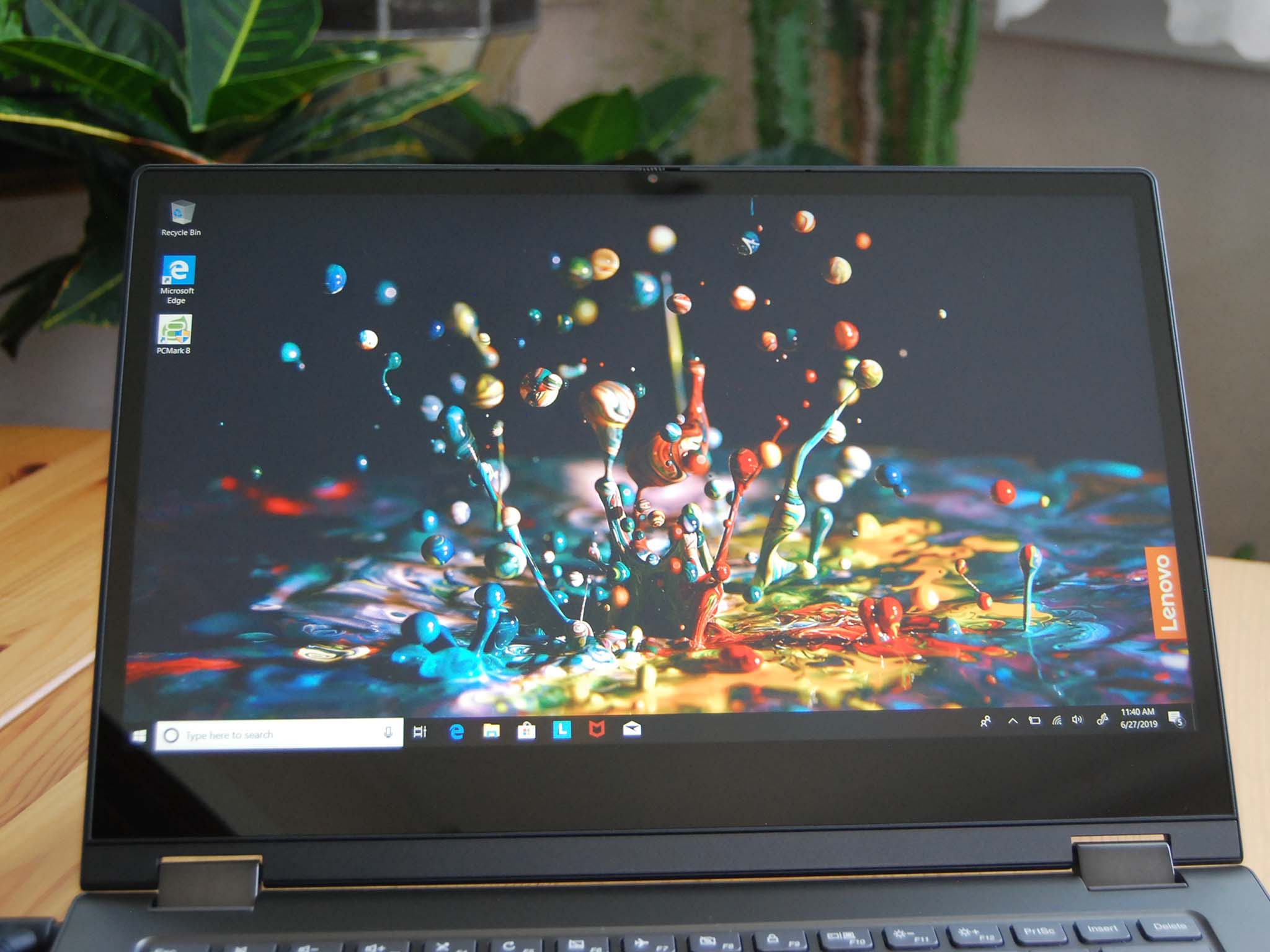
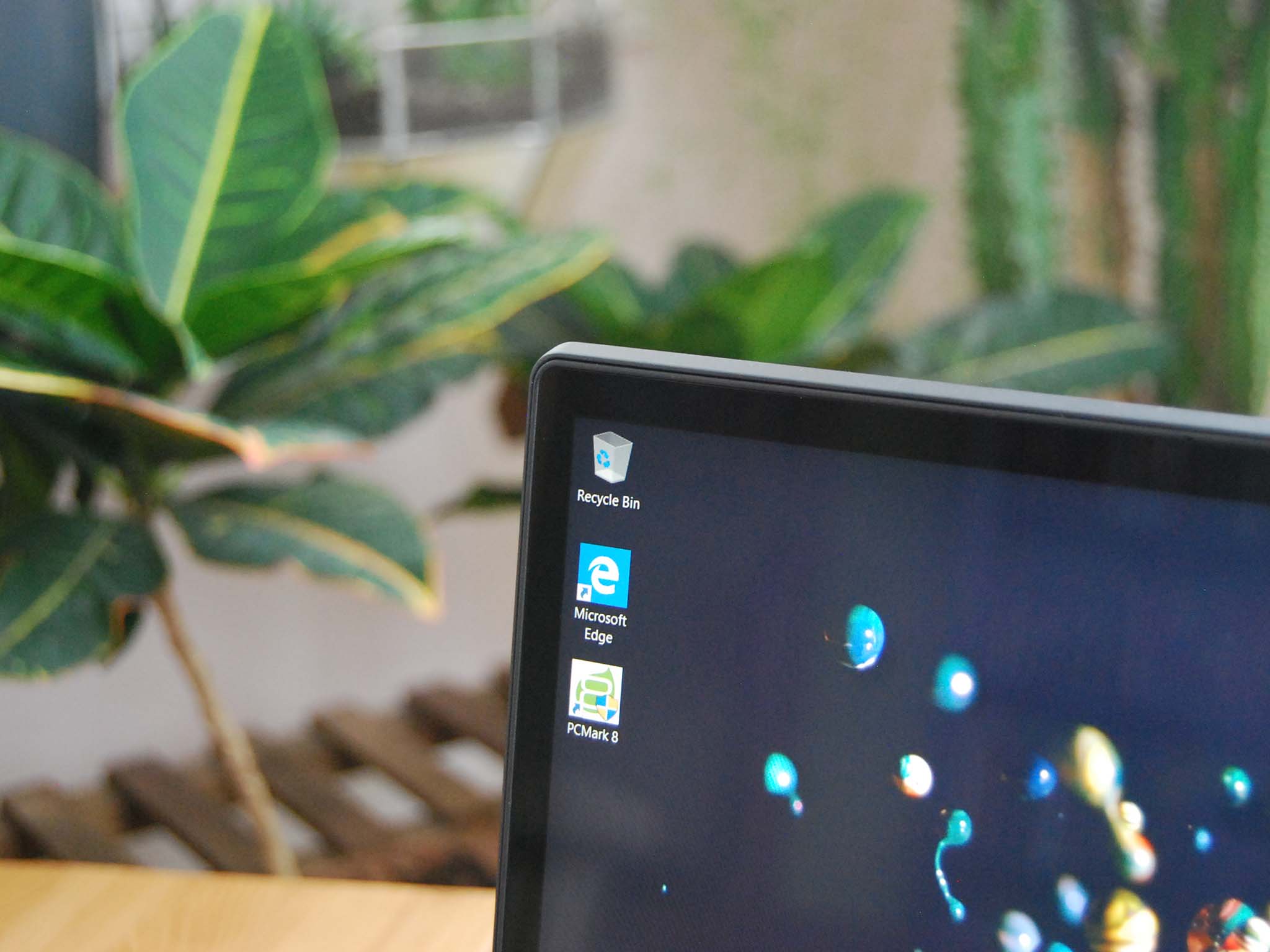
As with most budget laptops, the display in the Flex 14 takes a hit to brightness and color reproduction to keep the cost down. While you can get used to the poor color — it hit 66 percent sRGB and 50 percent AdobeRGB in my testing — it's the maximum 250-nit brightness that is aggravating, especially because of the glossy finish. Working in a bright room can be a pain, and you can forget about using the laptop outdoors if it's not completely overcast.
It does, however, have relatively thin bezel for a modern look, and an active pen can be added (if not already included with some models) for Windows Ink. The touch function does work well, which is especially important in a convertible laptop, and the FHD resolution is a huge step up over the HD models also available. Unless you're stuck to a tight budget, we recommend avoiding 768p.
Lenovo IdeaPad Flex 14 performance and battery
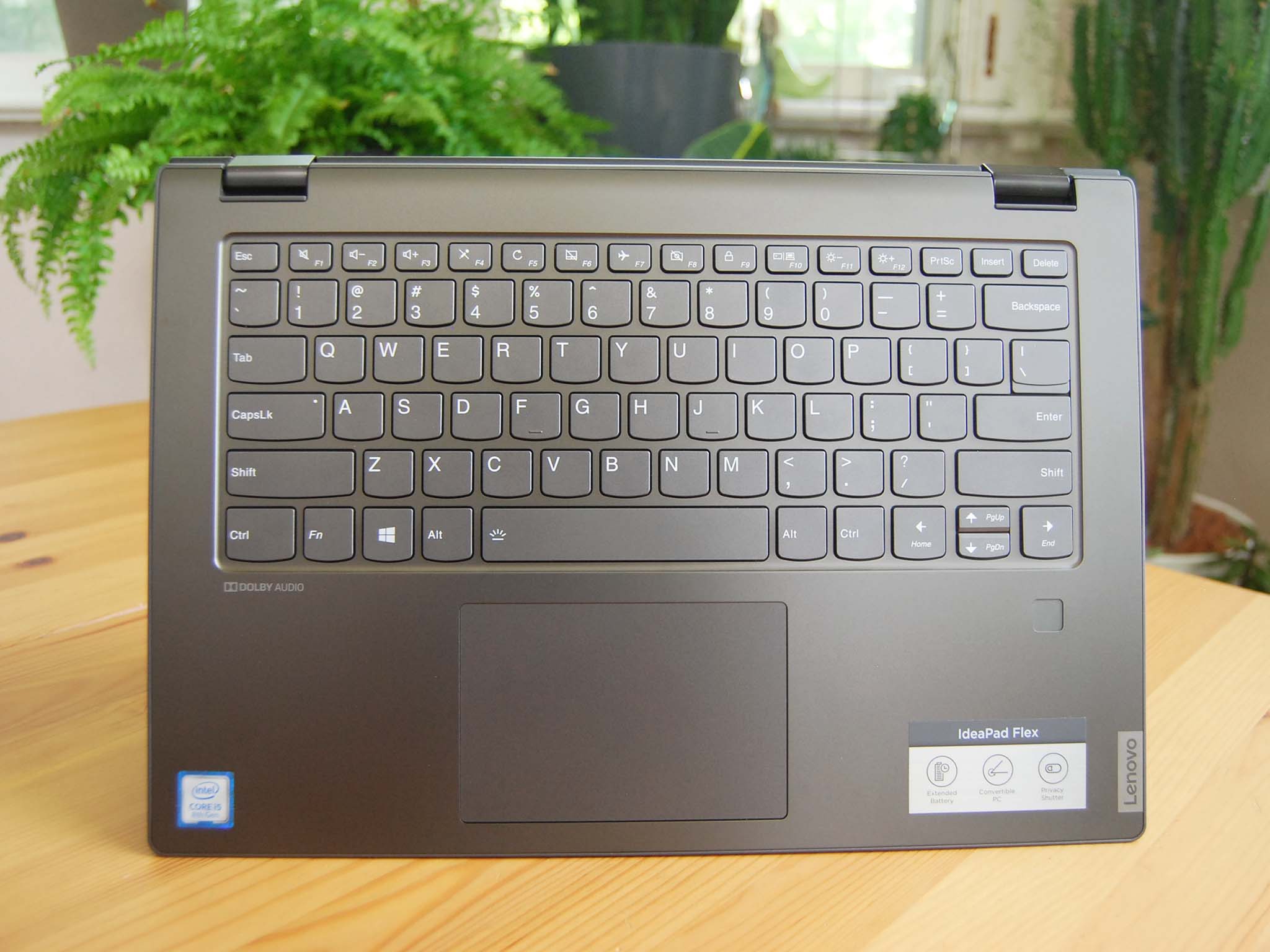
The 8th Gen Core i5 CPU, 16GB of DDR4 RAM, and 256GB PCIe SSD together delivered respectable performance, and you shouldn't have problems cutting through a standard day's work. To save some money you could drop down to a Pentium Gold 5405U CPU with 4GB of RAM, but that would only be suitable for light productivity tasks, and it would also come with the lower-res HD display.
If the $800 price of this model is a bit steep, your best bet is to check out the AMD models available at Amazon. A configuration with FHD display, active pen, AMD Ryzen 5 3500U CPU, 8GB of DDR4 RAM, and 256GB PCIe SSD costs about $550. You're going to get about the same performance as with our review model, yet you'll save more than $200.
In any case, battery life will still be an issue. With brightness at about 60 percent (which is quite dim considering it only hits 250 nits total) and battery on a balanced plan, I got between four and five hours before a charge was needed. That's not enough to get through a workday without packing your AC adapter, but at least rapid charge tech gets the battery back up to about 80 percent in an hour or so.
The other thing I noticed was fan noise. The single fan seems to run often, even when web browsing or video watching (and especially if the laptop is plugged in), and it's relatively loud. You'll be able to drown it out with the speakers, but keep in mind this isn't a silent device.
I ran some synthetic benchmarks to see how well the hardware within stacks up against other laptops we've recently reviewed. If you're interested in keeping your device up to date in the future, know that the single RAM slot and M.2 PCIe SSD can both be accessed with relative ease for DIY upgrades.
CPU
Geekbench 4.0 Benchmarks (Higher is better)
| Device | CPU | Single core | Multi core |
|---|---|---|---|
| Lenovo IdeaPad Flex 14 | i5-8265U | 4,485 | 13,279 |
| Dell Latitude 7400 2-in-1 | i7-8665U | 5,469 | 15,800 |
| Lenovo IdeaPad S940 | i7-8565U | 5,101 | 14,089 |
| Lenovo ThinkPad T490 | i7-8565U | 5,431 | 15,608 |
| Lenovo ThinkPad X390 | i7-8565U | 5,472 | 18,059 |
| MSI PS63 Modern | i7-8565U | 4,909 | 14,466 |
| Huawei MateBook X Pro | i7-8565U | 5,192 | 16,757 |
| HP Spectre x360 13t | i7-8565U | 5,056 | 14,767 |
| Surface Laptop 2 | i5-8250U | 4,203 | 13,233 |
| LG gram 14 2-in-1 | i7-8565U | 4,829 | 13,889 |
PCMark
PCMark Home Conventional 3.0
| Device | Score |
|---|---|
| Lenovo IdeaPad Flex 14 | 3,202 |
| Lenovo ThinkPad T490 | 3,620 |
| Lenovo ThinkPad X390 | 3,934 |
| LG gram 14 2-in-1 | 3,452 |
| Lenovo Yoga C930 | 3,506 |
SSD
CrystalDiskMark (Higher is better)
| Device | Read | Write |
|---|---|---|
| Lenovo IdeaPad Flex 14 | 3,405 MB/s | 1,512 MB/s |
| Dell Latitude 7400 2-in-1 | 3,110 MB/s | 2,825 MB/s |
| Lenovo IdeaPad S940 | 3,383 MB/s | 1,979 MB/s |
| Lenovo ThinkPad T490 | 3,254.8 MB/s | 2,954.9 MB/s |
| Lenovo ThinkPad X390 | 3,024 MB/s | 1,563.2 MB/s |
| Huawei MateBook X Pro | 3,0416 MB/s | 2,779 MB/s |
| HP Spectre x360 13t | 3,085 MB/s | 1,182 MB/s |
| LG gram 14 2-in-1 | 558.1 MB/s | 523.1 MB/s |
| Lenovo Yoga C930 | 2,596.2 MB/s | 806 MB/s |
The Samsung PM981 M.2 PCIe SSD offers excellent read and write speeds, and it can be upgraded at any time for something larger or faster.
Should you buy Lenovo's IdeaPad Flex 14?
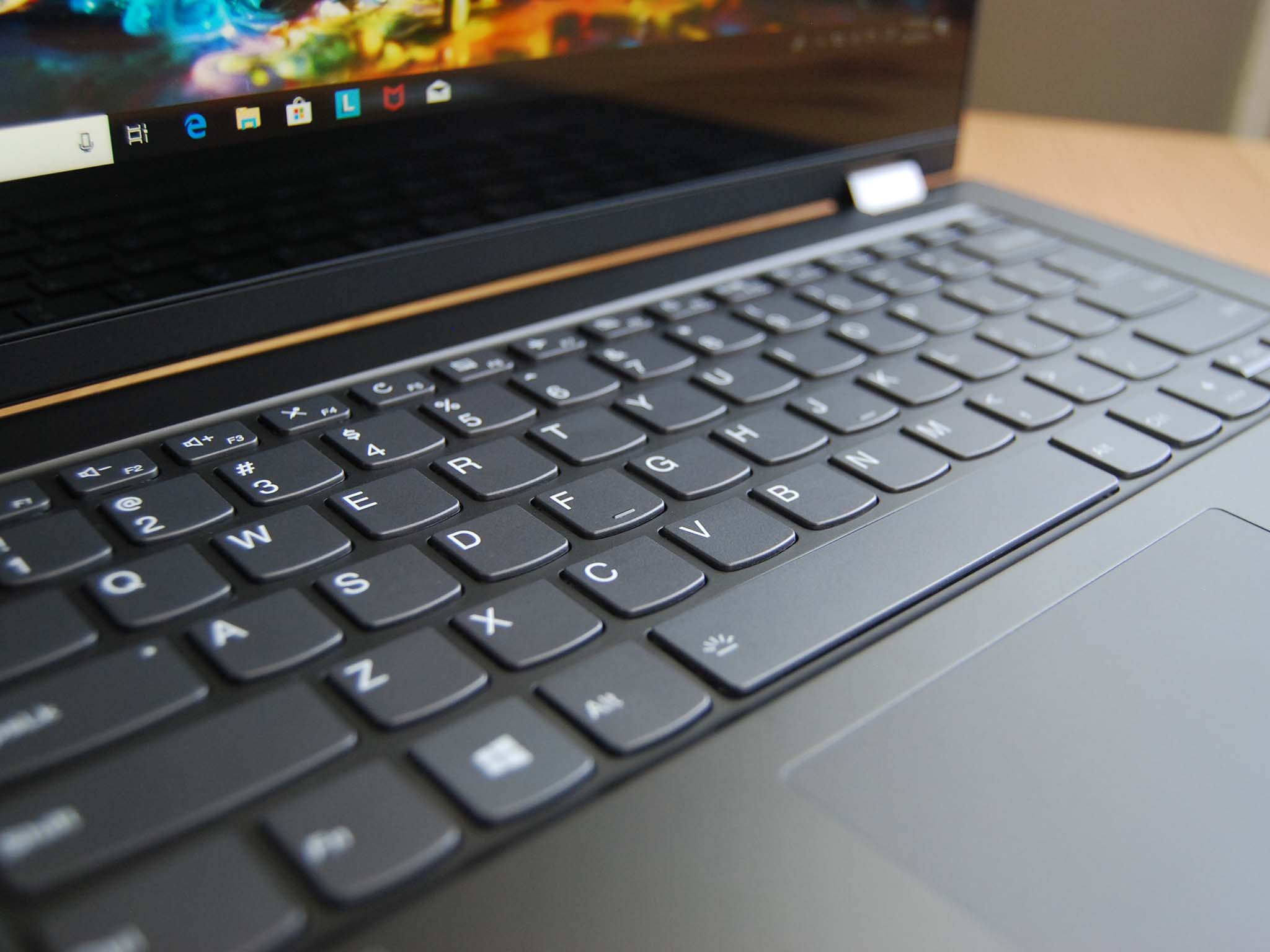
The IdeaPad Flex 14, everything considered, is a worthwhile budget convertible. Its slim chassis looks great, it's built well, and there's a generous selection of ports for connecting all your peripherals. As someone who types a lot every day, I loved the feel of the keyboard, and the Precision touchpad, though there was a bit of a hollow feel to it, tracked smoothly and had plenty of space for gestures.
The display didn't wow me due to poor color reproduction and dim brightness, but the touch function worked as it should, and the option to add an active pen into the mix is an attractive feature for anyone who likes sketching or jotting down notes while in tablet mode. There's also the battery life that hovers around five hours from a charge, which is disappointing but not entirely unexpected at this price.
If you aren't entirely partial to Intel hardware, we recommend checking out AMD configurations available from Amazon. Though you will get 8GB of RAM rather than 16GB, you will be able to save a considerable amount of money compared to the review model. The Ryzen 5 3500U configuration costs about $550, while a configuration with Ryzen 7 3700U CPU costs about $570.

Cale Hunt brings to Windows Central more than eight years of experience writing about laptops, PCs, accessories, games, and beyond. If it runs Windows or in some way complements the hardware, there’s a good chance he knows about it, has written about it, or is already busy testing it.
